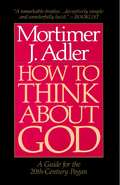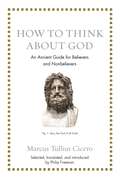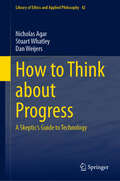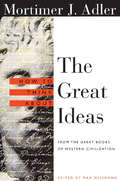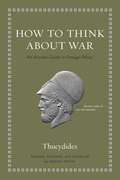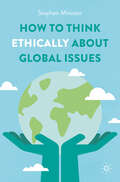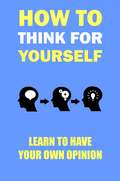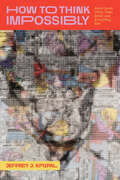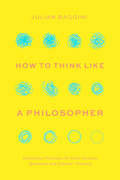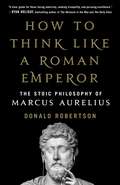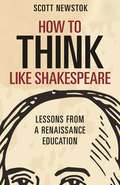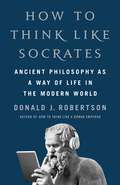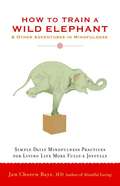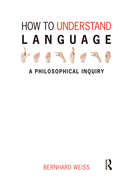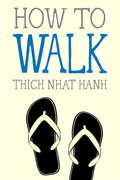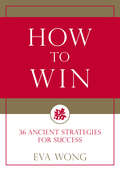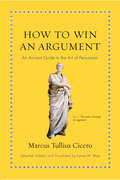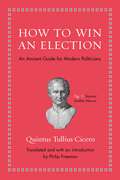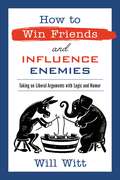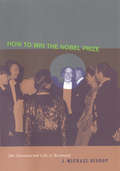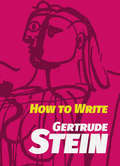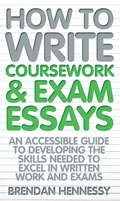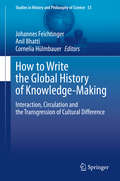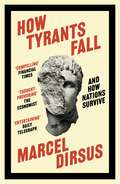- Table View
- List View
How to Think About God: A Guide for the 20th-Century Pagan
by Mortimer J. AdlerDr. Adler, in his discussion, extends and modernizes the argument for the existence of God developed by Aristotle and Aquinas. Without relying on faith, mysticism, or science (none of which, according to Dr. Adler, can prove or disprove the existence of God), he uses a rationalist argument to lead the reader to a point where he or she can see that the existence of God is not necessarily dependent upon a suspension of disbelief. Dr. Adler provides a nondogmatic exposition of the principles behind the belief that God, or some other supernatural cause, has to exist in some form. Through concise and lucid arguments, Dr. Adler shapes a highly emotional and often erratic conception of God into a credible and understandable concept for the lay person.
How to Think about God: An Ancient Guide for Believers and Nonbelievers (Ancient Wisdom for Modern Readers)
by Marcus CiceroA vivid and accessible new translation of Cicero’s influential writings on the Stoic idea of the divineMost ancient Romans were deeply religious and their world was overflowing with gods—from Jupiter, Minerva, and Mars to countless local divinities, household gods, and ancestral spirits. One of the most influential Roman perspectives on religion came from a nonreligious belief system that is finding new adherents even today: Stoicism. How did the Stoics think about religion? In How to Think about God, Philip Freeman presents vivid new translations of Cicero's On the Nature of the Gods and The Dream of Scipio. In these brief works, Cicero offers a Stoic view of belief, divinity, and human immortality, giving eloquent expression to the religious ideas of one of the most popular schools of Roman and Greek philosophy.On the Nature of the Gods and The Dream of Scipio are Cicero's best-known and most important writings on religion, and they have profoundly shaped Christian and non-Christian thought for more than two thousand years, influencing such luminaries as Augustine, Thomas Aquinas, Dante, and Thomas Jefferson. These works reveal many of the religious aspects of Stoicism, including an understanding of the universe as a materialistic yet continuous and living whole in which both the gods and a supreme God are essential elements.Featuring an introduction, suggestions for further reading, and the original Latin on facing pages, How to Think about God is a compelling guide to the Stoic view of the divine.
How to Think about Progress: A Skeptic's Guide to Technology (Library of Ethics and Applied Philosophy #42)
by Nicholas Agar Stuart Whatley Dan WeijersHow to Think about Progress is an interdisciplinary work exploring whether optimistic claims about technology’s potential stand up to humanity’s most difficult challenges. Will technology solve the problems of climate change, pandemics, cancer, loneliness, unhappiness, and even death? The authors show that techno-hype is all too often accepted because of the horizon bias, i.e. the modern propensity to believe that any problem that can be solved with technology will be solved in the very near future. The authors situate their analysis in a broad context, drawing on history, literature, and popular culture to emphasize their case against techno-hype. They also draw on a wide range of research, including that of biologists, philosophers of science and of language, psychologists, theorists of technological change, specialists on digital technologies, historians of ideas, and economists. As a corrective to much mainstream “futurism,” the book offers principles for seeing through much of the techno-hype that circulates online and in best-selling books. The authors share insights (without the jargon) from a variety of academic disciplines, making this book an engaging read for all audiences. Readers will find a balanced framework for thinking and writing about technological progress in the face of truly vexing challenges like cancer, climate change, and colonizing mars.
How to Think About the Great Ideas
by Max Weismann Mortimer AdlerTime magazine called Mortimer J. Adler a "philosopher for everyman." In this guide to considering the big questions, Adler addresses the topics all men and women ponder in the course of life, such as "What is love?", "How do we decide the right thing to do?", and, "What does it mean to be good?" Drawing on his extensive knowledge of Western literature, history, and philosophy, the author considers what is meant by democracy, law, emotion, language, truth, and other abstract concepts in light of more than two millennia of Western civilization and discourse. Adler's essays offer a remarkable and contemplative distillation of the Great Ideas of Western Thought.
How to Think about War: An Ancient Guide to Foreign Policy (Ancient Wisdom For Modern Readers Ser.)
by Thucydides Johanna HaninkAn accessible modern translation of essential speeches from Thucydides’s History that takes readers to the heart of his profound insights on diplomacy, foreign policy, and warWhy do nations go to war? What are citizens willing to die for? What justifies foreign invasion? And does might always make right? For nearly 2,500 years, students, politicians, political thinkers, and military leaders have read the eloquent and shrewd speeches in Thucydides’s History of the Peloponnesian War for profound insights into military conflict, diplomacy, and the behavior of people and countries in times of crisis. How to Think about War presents the most influential and compelling of these speeches in an elegant new translation by classicist Johanna Hanink, accompanied by an enlightening introduction, informative headnotes, and the original Greek on facing pages. The result is an ideally accessible introduction to Thucydides’s long and challenging History.Thucydides intended his account of the clash between classical Greece’s mightiest powers—Athens and Sparta—to be a “possession for all time.” Today, it remains a foundational work for the study not only of ancient history but also contemporary politics and international relations. How to Think about War features speeches that have earned the History its celebrated status—all of those delivered before the Athenian Assembly, as well as Pericles’s funeral oration and the notoriously ruthless “Melian Dialogue.” Organized by key debates, these complex speeches reveal the recklessness, cruelty, and realpolitik of Athenian warfighting and imperialism.The first English-language collection of speeches from Thucydides in nearly half a century, How to Think about War takes readers straight to the heart of this timeless thinker.
How to Think Ethically about Global Issues
by Stephen MinisterThis textbook is an introduction to thinking ethically about global issues. Unlike existing books in this area, this book is truly interdisciplinary and includes a range of voices from both the Global South and the Global North. Rather than simply applying Western theories to case studies, Prof. Stephen Minister shows readers how to consider context and complexity, while respecting the agency of people elsewhere. It weaves together the work of thinkers and writers from the Global South with philosophical work on global ethics, relevant scholarship from other academic fields, and stories from fieldwork studying global issues on four continents. The textbook explores a variety of topics, including: cultural difference, gender, population, poverty, natural disasters, and development. It then encourages students to build on these ideas and think more deeply about topics such as foreign aid, inequality, immigration, international trade, climate change, human rights, and war and terrorism. Because the book’s style is accessible and engaging, it will be an excellent text for ethics and global studies courses, as well as being of interest to general readers who want to think better about global issues.
How to think for yourself: Learn to have your own opinion
by Rodrigo ChavesYou may not realize it, but everything you think has been determined by someone else. Your beliefs and convictions do not belong to you, they were dictated and you copied them. If you really want to own your thoughts, read this guide.
How to Think Impossibly: About Souls, UFOs, Time, Belief, and Everything Else
by Jeffrey J. KripalA mind-bending invitation to experience the impossible as fundamentally human. From precognitive dreams and telepathic visions to near-death experiences, UFO encounters, and beyond, so-called impossible phenomena are not supposed to happen. But they do happen—all the time. Jeffrey J. Kripal asserts that the impossible is a function not of reality but of our everchanging assumptions about what is real. How to Think Impossibly invites us to think about these fantastic (yet commonplace) experiences as an essential part of being human, expressive of a deeply shared reality that is neither mental nor material but gives rise to both. Thinking with specific individuals and their extraordinary experiences in vulnerable, open, and often humorous ways, Kripal interweaves humanistic and scientific inquiry to foster an awareness that the fantastic is real, the supernatural is super natural, and the impossible is possible.
How to Think like a Philosopher: Twelve Key Principles for More Humane, Balanced, and Rational Thinking
by Julian BagginiAn invitation to the habits of good thinking from philosopher Julian Baggini. By now, it should be clear: in the face of disinformation and disaster, we cannot hot take, life hack, or meme our way to a better future. But how should we respond instead? In How to Think like a Philosopher, Julian Baggini turns to the study of reason itself for practical solutions to this question, inspired by our most eminent philosophers, past and present. Baggini offers twelve key principles for a more humane, balanced, and rational approach to thinking: pay attention; question everything (including your questions); watch your steps; follow the facts; watch your language; be eclectic; be a psychologist; know what matters; lose your ego; think for yourself, not by yourself; only connect; and don’t give up. Each chapter is chockful of real-world examples showing these principles at work—from the discovery of penicillin to the fight for trans rights—and how they lead to more thoughtful conclusions. More than a book of tips and tricks (or ways to be insufferably clever at parties), How to Think like a Philosopher is an invitation to develop the habits of good reasoning that our world desperately needs.
How to Think Like a Roman Emperor: The Stoic Philosophy of Marcus Aurelius
by Donald J. Robertson"This book is a wonderful introduction to one of history's greatest figures: Marcus Aurelius. His life and this book are a clear guide for those facing adversity, seeking tranquility and pursuing excellence." —Ryan Holiday, bestselling author of The Obstacle is the Way and The Daily StoicThe life-changing principles of Stoicism taught through the story of its most famous proponent.Roman emperor Marcus Aurelius was the last famous Stoic philosopher of the ancient world. The Meditations, his personal journal, survives to this day as one of the most loved self-help and spiritual classics of all time. In How to Think Like a Roman Emperor, cognitive psychotherapist Donald Robertson weaves the life and philosophy of Marcus Aurelius together seamlessly to provide a compelling modern-day guide to the Stoic wisdom followed by countless individuals throughout the centuries as a path to achieving greater fulfillment and emotional resilience. How to Think Like a Roman Emperor takes readers on a transformative journey along with Marcus, following his progress from a young noble at the court of Hadrian—taken under the wing of some of the finest philosophers of his day—through to his reign as emperor of Rome at the height of its power. Robertson shows how Marcus used philosophical doctrines and therapeutic practices to build emotional resilience and endure tremendous adversity, and guides readers through applying the same methods to their own lives.Combining remarkable stories from Marcus’s life with insights from modern psychology and the enduring wisdom of his philosophy, How to Think Like a Roman Emperor puts a human face on Stoicism and offers a timeless and essential guide to handling the ethical and psychological challenges we face today.
How to Think like Shakespeare: Lessons from a Renaissance Education (Skills For Scholars Ser.)
by Scott NewstokA lively and engaging guide to vital habits of mind that can help you think more deeply, write more effectively, and learn more joyfullyHow to Think like Shakespeare offers an enlightening and entertaining guide to the craft of thought—one that demonstrates what we've lost in education today, and how we might begin to recover it. In fourteen brief, lively chapters that draw from Shakespeare's world and works, and from other writers past and present, Scott Newstok distills vital habits of mind that can help you think more deeply, write more effectively, and learn more joyfully, in school or beyond.Challenging a host of today's questionable notions about education, Newstok shows how mental play emerges through work, creativity through imitation, autonomy through tradition, innovation through constraint, and freedom through discipline. It was these practices, and a conversation with the past—not a fruitless obsession with assessment—that nurtured a mind like Shakespeare's. And while few of us can hope to approach the genius of the Bard, we can all learn from the exercises that shaped him.Written in a friendly, conversational tone and brimming with insights, How to Think like Shakespeare enacts the thrill of thinking on every page, reviving timeless—and timely—ways to stretch your mind and hone your words.
How to Think Like Socrates: Ancient Philosophy as a Way of Life in the Modern World
by Donald J. RobertsonHow can we apply the teachings of the greatest ancient philosopher to modern life?Socrates is the quintessential Athenian philosopher, the source of the entire Western philosophical tradition, and Godfather to the Stoics. He spent his life teaching practical philosophy to ordinary people in the streets of Athens, yet few people today are familiar with the wisdom he has to offer us.How to Think Like Socrates is an accessible and informative guide to the life of one of the greatest thinkers in history, and the first book to focus on applying his ideas to our daily lives. Author Donald J. Robertson transports readers back to ancient Athens, expertly weaving together a page-turning account of a philosopher who eschewed material pleasures and stood by his beliefs, even in the face of controversy, with a steadfastness that ultimately resulted in his execution.How to Think Like Socrates highlights the continuing value of the Socratic Method to modern life. As a practicing cognitive-behavioral psychotherapist, Robertson also uses his expertise to reveal many parallels between the evidence-based concepts and techniques of modern psychology and the philosophy of Socrates, and shows how his philosophical insights can guide and benefit all of us to this day.
How to Train a Wild Elephant: And Other Adventures in Mindfulness
by Jan Chozen BaysA growing body of research is showing that mindfulness can reduce stress, improve physical health, and improve one's overall quality of life. Jan Chozen Bays, MD--physician and Zen teacher--has developed a series of simple practices to help us cultivate mindfulness as we go about our ordinary, daily lives. Exercises include: taking three deep breaths before answering the phone, noticing and adjusting your posture throughout the day, eating mindfully, and leaving no trace of yourself after using the kitchen or bathroom. Each exercise is presented with tips on how to remind yourself and a short life lesson connected with it.
How to Understand Language: A Philosophical Inquiry
by Bernhard WeissWhy are philosophers, as opposed to, say, linguists and psychologists, puzzled by language? How should we attempt to shed philosophical light on the phenomenon of language? "How to Understand Language" frames its discussion by these two questions. The book begins by thinking about the reasons that language is hard to understand from a philosophical point of view and, armed with the fruits of that discussion, begins searching for an approach to these questions. After finding fault with approaches based on philosophical analysis and on translation it undertakes an extended investigation of the programme of constructing a theory of meaning. Donald Davidson's advocacy of that approach becomes pivotal; though, the book endorses his broad approach, it argues strongly against the roles both of truth theory and of radical interpretation.
How to Walk
by Thich Nhat Hanh Jason DeantonisHow to Walk is the fourth title in Parallax's popular Mindfulness Essentials Series of how-to titles by Zen Master Thich Nhat Hanh, introducing beginners and reminding seasoned practitioners of the essentials of mindfulness practice. <P> Slow, concentrated walking while focusing on in- and out-breaths allows for a unique opportunity to be in the present. There is no need to arrive somewhere--each step is the arrival to concentration, joy, insight, and the momentary enlightenment of aliveness. When your foot touches the Earth with awareness, you make yourself alive and the Earth real, and you forget for one minute the searching, rushing, and longing that rob our daily lives of awareness and cause us to "sleepwalk" through life.Thich Nhat Hanh shares amusing stories of the impact mindful walking has on both the walker and those who notice him, and shows how mindful walking can be a technique for diminishing depression, recapturing wonder, and expressing gratitude. Pocket-sized, with original two color illustrations by Jason DeAntonis, How to Walk is a unique gift for all ages, sharing a simple practice that can have a profound effect on practitioners.
How to Win: 36 Ancient Strategies for Success
by Eva WongPotent advice on how to think and act strategically in business, politics, and relationships--drawn from classic Chinese military and political expertise.The ancient strategies of war and politics have much to offer us in navigating the complicated challenges we face today--and to help us wisely and effectively meet our business, political, and relational goals. Here, eminent Chinese scholar and Taoist teacher Eva Wong unpacks the wisdom of The Thirty-Six Strategies, a collection of advice encoded in sayings, steeped in Chinese history and culture. She explores strategies attributed to renowned military philosophers such as Sun Tzu and Zhuge Liang (aka "The Sleeping Dragon"), along with other less-known advisors, that were implemented during three of the most chaotic eras of Chinese history--the Spring and Autumn Period, the Warring States Period, and the Three Kingdoms. Covering three categories of strategy--proactive, reactive, and desperate--Wong expertly connects the words of ancient military philosophers with timeless advice, as useful today as it was in the Tang dynasty (618-906) when this collection was originally gathered. In Chinese military philosophy and political theory, the thirty-six strategies are considered "yin" or "shadow" in nature, meaning that they operate best in darkness and concealment. As Wong writes, "Desperate times call for desperate measures, and since the thirty-six strategies rose out of times of war and conflict, it is inevitable that they were used to win wars, triumph over opponents, take advantage of situations, and survive when defeat is imminent."
How to Win an Argument: An Ancient Guide to the Art of Persuasion
by Marcus Tullius Cicero James M. MayAll of us are faced countless times with the challenge of persuading others, whether we're trying to win a trivial argument with a friend or convince our coworkers about an important decision. Instead of relying on untrained instinct--and often floundering or failing as a result--we'd win more arguments if we learned the timeless art of verbal persuasion, rhetoric. How to Win an Argument gathers the rhetorical wisdom of Cicero, ancient Rome's greatest orator, from across his works and combines it with passages from his legal and political speeches to show his powerful techniques in action. The result is an enlightening and entertaining practical introduction to the secrets of persuasive speaking and writing--including strategies that are just as effective in today's offices, schools, courts, and political debates as they were in the Roman forum.How to Win an Argument addresses proof based on rational argumentation, character, and emotion; the parts of a speech; the plain, middle, and grand styles; how to persuade no matter what audience or circumstances you face; and more. Cicero's words are presented in lively translations, with illuminating introductions; the book also features a brief biography of Cicero, a glossary, suggestions for further reading, and an appendix of the original Latin texts.Astonishingly relevant, this unique anthology of Cicero's rhetorical and oratorical wisdom will be enjoyed by anyone who ever needs to win arguments and influence people--in other words, all of us.
How to Win an Election: An Ancient Guide for Modern Politicians (Ancient Wisdom for Modern Readers)
by Quintus Tullius CiceroA primer on campaigning in ancient Rome that reads like a strategy memo from a modern political consultantHow to Win an Election is an ancient Roman guide for campaigning that is as up-to-date as tomorrow's headlines. In 64 BC when idealist Marcus Cicero, Rome's greatest orator, ran for consul (the highest office in the Republic), his practical brother Quintus decided he needed some no-nonsense advice on running a successful campaign. What follows in his short letter are timeless bits of political wisdom, from the importance of promising everything to everybody and reminding voters about the sexual scandals of your opponents to being a chameleon, putting on a good show for the masses, and constantly surrounding yourself with rabid supporters. Presented here in a lively and colorful new translation, with the Latin text on facing pages, this unashamedly pragmatic primer on the humble art of personal politicking is dead-on (Cicero won)—and as relevant today as when it was written.A little-known classic in the spirit of Machiavelli's Prince, How to Win an Election is required reading for politicians and everyone who enjoys watching them try to manipulate their way into office.
How to Win Friends and Influence Enemies: Taking On Liberal Arguments with Logic and Humor
by Will WittPolitical commentator and media personality Will Witt gives young conservatives the ammunition they need to fight back against the liberal media.Popular culture in America today is dominated by the left. Most young people have never even heard of conservative values from someone their age, and if they do, the message is often bland and outdated. Almost every Hollywood actor, musician, media personality, and role model for young people in America rejects conservative values, and Gen Zs and millennials are quick to regurgitate these viewpoints without developing their own opinions on issues. So many young conservatives in America want to stand up for their beliefs in their classrooms, at their jobs, with their friends, or on social media, but they don&’t have the tools to do so. In How to Win Friends and Influence Enemies, Will Witt arms Gen Zs and millennials with the knowledge and skills to combat the leftist narrative they hear every day.
How to Win the Nobel Prize: An Unexpected Life in Science (The Jerusalem-Harvard Lectures #7)
by J. Michael BishopIn 1989 Michael Bishop and Harold Varmus were awarded the Nobel Prize for their discovery that normal genes under certain conditions can cause cancer. In this book, Bishop tells us how he and Varmus made their momentous discovery. More than a lively account of the making of a brilliant scientist, How to Win the Nobel Prize is also a broader narrative combining two major and intertwined strands of medical history: the long and ongoing struggles to control infectious diseases and to find and attack the causes of cancer. Alongside his own story, that of a youthful humanist evolving into an ambivalent medical student, an accidental microbiologist, and finally a world-class researcher, Bishop gives us a fast-paced and engrossing tale of the microbe hunters. It is a narrative enlivened by vivid anecdotes about our deadliest microbial enemies--the Black Death, cholera, syphilis, tuberculosis, malaria, smallpox, HIV--and by biographical sketches of the scientists who led the fight against these scourges. Bishop then provides an introduction for nonscientists to the molecular underpinnings of cancer and concludes with an analysis of many of today's most important science-related controversies--ranging from stem cell research to the attack on evolution to scientific misconduct. How to Win the Nobel Prize affords us the pleasure of hearing about science from a brilliant practitioner who is a humanist at heart. Bishop's perspective will be valued by anyone interested in biomedical research and in the past, present, and future of the battle against cancer.
How to Write (Sun And Moon Classics Ser. #No. 83)
by Gertrude SteinFirst published in 1931, this book contains Gertrude Stein’s thoughts about the craft of writing. It is written in her usual experimental style, yet it is not difficult to understand, and even traditionalists will find that it has many things to say to them. <P><P> Her experimental style includes such elements as disconnectedness, a love of refrain and rhyme, a search for rhythm and balance, a dislike of punctuation (especially the comma), a dismissal of the conventional significance of words, and a repetition of words and phrases. Her approach to writing is impossible to summarize, but many critics see a strain of American humor in her work, borne out immediately by some of the chapter titles: “Saving the Sentence,” “Arthur a Grammar,” “Regular Regularly in Narrative,” and “Finally George a Vocabulary.” <P><P> Readers who have not encountered Gertrude Stein or who have had difficulty with her other work will find this book useful as an entry into her writing. It is also in itself a unique, exhilarating experience.
How To Write Coursework and Exam Essays: An Accessible Guide To Developing The Skills Needed To Excel In Written Work And Exams
by Brendan HennessyWriting good essays is a vital study skill for all stages of education, from GCSE to degree level. This highly successful and thoroughly practical guide leads you step-by-step through the whole process, including: *How to put your ideas into shape * Making your essay coherent and giving it conviction *How to think straight and argue well *How to write a good introduction and conclusion *Improving your style *Editing and rewriting. Now in its 6th edition this book has been thoroughly revised and updated to take account of feedback from teachers and students, incluyding the reqirements of online research. Use the techniques and exercises in this book to develop the originality and good writing that examiners look for - and write essays of distinction every time.
How to Write the Global History of Knowledge-Making: Interaction, Circulation and the Transgression of Cultural Difference (Studies in History and Philosophy of Science #53)
by Johannes Feichtinger Anil Bhatti Cornelia HülmbauerThis multidisciplinary collection of essays provides a critical and comprehensive understanding of how knowledge has been made, moved and used, by whom and for what purpose. To explain how new knowledge emerges, this volume offers a two-fold conceptual move: challenging both the premise of insurmountable differences between confined, autarkic cultures and the linear, nation-centered approach to the spread of immutable stocks of knowledge. Rather, the conceptual focus of the book is on the circulation, amalgamation and reconfiguration of locally shaped bodies of knowledge on a broader, global scale. The authors emphasize that the histories of interaction have been made less transparent through the study of cultural representations thus distorting the view of how knowledge is actually produced.Leading scholars from a range of fields, including history, philosophy, social anthropology and comparative culture research, have contributed chapters which cover the period from the early modern age to the present day and investigate settings in Africa, Asia, and Europe. Their particular focus is on areas that have largely been neglected until now. In this work, readers from many disciplines will find new approaches to writing the global history of knowledge-making, especially historians, scholars of the history and philosophy of science, and those in culture studies.
How Tyrants Fall: And How Nations Survive
by Marcel Dirsus'Gripping . . . essential and captivating' BRADLEY HOPE'A sparkling read full of original observations and captivating insights' KATJA HOYER'Utterly compelling . . . jaw-dropping' BRIAN KLAAS'Fascinating, wide-ranging . . . highly-entertaining' PETER GEOGHEGANStrongmen are rising. Democracies are faltering. How does tyranny end?Tyrants project invincibility, but all of them fall. This is because they face critical weaknesses that can form a fatal trap. Whether it's their inner circle turning against them or resentment of elites in the military, the masses alienated by cronyism or revolutionaries plotting in exile, tyrants always have more enemies than friends. And when they fall tyrants don't quietly retire - they face exile, prison or death. What happens in the aftermath can change the fate of a nation.Meeting with coup leaders, dissidents and soldiers, political scientist Marcel Dirsus draws on extraordinary interviews to examine the workings and malfunctions of tyrants. We hear from a revolutionary (codename 'Satan') who risked Stasi capture to undermine an oppressive regime, an unapologetic former leader of a Burundian rebel group which carried out a massacre, and an American-Gambian activist who plotted to liberate his homeland on breaks during his construction job. But understanding dictators isn't enough. How Tyrants Fall is the gripping, deeply researched blueprint for how to bring them down.
How Tyrants Fall: And How Nations Survive
by Marcel Dirsus'Gripping . . . essential and captivating' BRADLEY HOPE'A sparkling read full of original observations and captivating insights' KATJA HOYER'Utterly compelling . . . jaw-dropping' BRIAN KLAAS'Fascinating, wide-ranging . . . highly-entertaining' PETER GEOGHEGANStrongmen are rising. Democracies are faltering. How does tyranny end?Tyrants project invincibility, but all of them fall. This is because they face critical weaknesses that can form a fatal trap. Whether it's their inner circle turning against them or resentment of elites in the military, the masses alienated by cronyism or revolutionaries plotting in exile, tyrants always have more enemies than friends. And when they fall tyrants don't quietly retire - they face exile, prison or death. What happens in the aftermath can change the fate of a nation.Meeting with coup leaders, dissidents and soldiers, political scientist Marcel Dirsus draws on extraordinary interviews to examine the workings and malfunctions of tyrants. We hear from a revolutionary (codename 'Satan') who risked Stasi capture to undermine an oppressive regime, an unapologetic former leader of a Burundian rebel group which carried out a massacre, and an American-Gambian activist who plotted to liberate his homeland on breaks during his construction job. But understanding dictators isn't enough. How Tyrants Fall is the gripping, deeply researched blueprint for how to bring them down.
